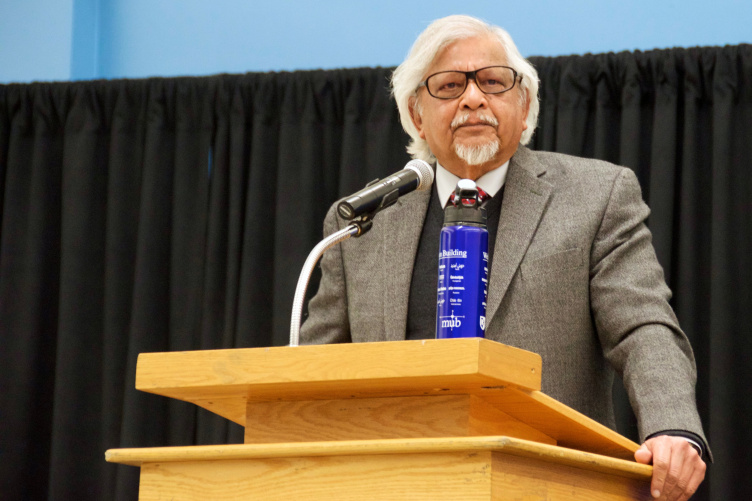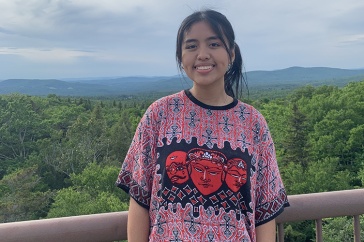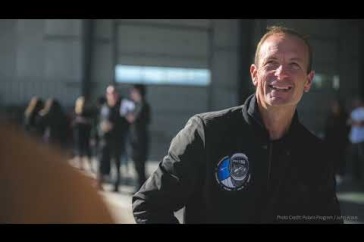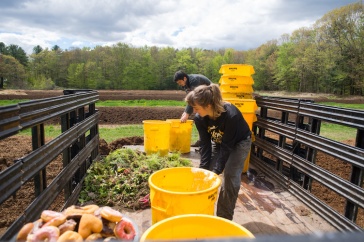
Arun Gandhi is one of millions touched by the work of Indian civil rights leader Mahatma Gandhi, but his connection to the man is more than admiration: Arun Gandhi is the grandson of Mahatma Gandhi and grew up learning lessons of nonviolence directly from him. Gandhi now travels internationally and shares his grandfather’s teachings, instilling concepts of peace in younger generations.
Gandhi recently spoke at UNH as part of the MUB Current Issues Lecture Series. The event was sponsored by the Memorial Union Building, Residential Life, Amnesty International and the Carsey School of Public Policy.
When Gandhi was 6 years old, he threw away a worn pencil, believing his grandfather would give him a new one. Instead, Mahatma Gandhi reproached him and sent him outside in the dark with a flashlight to find the pencil. “I said, ‘You’re kidding, right?’ He wasn’t. I spent hours out there trying to find it,” Gandhi said.
Mahatma Gandhi believed throwing away that pencil was a form of violence. His grandson was lucky to have such a resource while others did not, even if the pencil was used and almost depleted.
In his lecture, Gandhi divided violence into two categories: passive violence and physical violence. The latter is familiar — attacks that injure the body. Gandhi, however, believes passive violence is a deadlier force that takes form in oppression, prejudice, depriving others of necessities and other types of emotional and mental assailment.
“We throw away our natural resources and that is passive violence against nature. We overconsume products, and people in other places do not get enough, or any at all, and that is passive violence against humanity,” Gandhi said.
“My grandfather said anger is like electricity. It is just as powerful and just as useful, but only if we use it intelligently."
A way to determine if an act is passive violence is to ask if it would hurt the perpetrator if done to them. If so, it is. “My grandfather said we commit passive violence all the time, every day, consciously and unconsciously, and that creates anger in the victim. They act out with physical violence to seek justice,” Gandhi said.
This anger, however, can motivate and strengthen if used correctly and can alter a person’s life. “My grandfather said anger is like electricity. It is just as powerful and just as useful, but only if we use it intelligently. It’s just as destructive and abusive if used incorrectly,” Gandhi said. “If we learn to use it constructively it would improve society.”
So what does one use productive anger for? Constructive, compassionate sharing.
Constructive and compassionate sharing provides resources and skills to help someone in need realize their potential and thrive without assistance. “Most of our sharing today is not constructive, which makes the poor dependent and doesn’t help them improve their situations in the long run,” Gandhi said.
During the lecture, Gandhi discussed an example of giving a hungry person a dollar without thinking about why they were hungry in the first place. “We’re just happy we did our good deed of the day,” he said. “That is what my grandfather meant about helping people solely out of pity and not out of compassion.”
The process begins with finding the skills and opportunities one has to help others and addressing one’s own beliefs about the world. “We have to look into our own actions or inactions and see how we can improve ourselves so that we don’t waste our resources, but rather use those resources to help people achieve better standards of living,” Gandhi said.
Even small actions can have big effects. Donating educational supplies, limiting food waste and sharing knowledge with others are ways the average person can combat passive violence. Using kinder language and promoting inclusivity can tackle passive violence in its forms of oppression and prejudice as well.
Gandhi believes that practicing nonviolence is more than ending war and that altering acts of violence to help others is the road to a peaceful world.
“If we don’t change our habits, we won’t be able to change the world,” Gandhi said.
-
Written By:
Elizabeth Fiske '18 | Communications and Public Affairs | epf2002@wildcats.unh.edu



















































